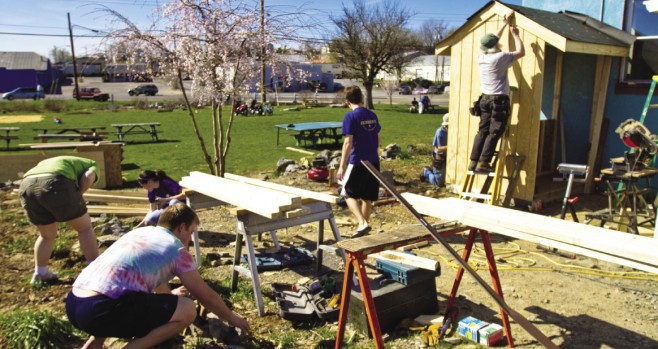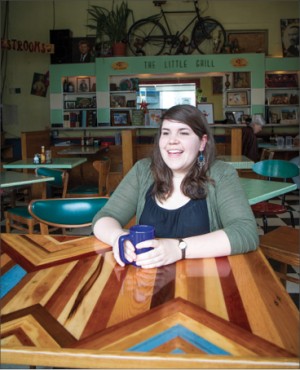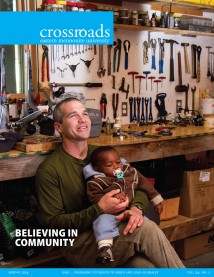
EMU students often participate in work days at Our Community Place. (Photo by Jon Styer)
Let’s begin in 1992 , when the Free Food For All Soup Kitchen opened to the world, every Monday at noon, at The Little Grill restaurant in downtown Harrisonburg.
Ron Copeland, the restaurant’s owner, drew inspiration for the soup kitchen from a number of different sources, including his Christian upbringing and political views shaped by his “rabid Democrat,” FDR-idolizing mother. The model for the meals themselves was borrowed from the countercultural Rainbow Gatherings movement, in which people calling themselves the Rainbow Family would meet in national forests across the country to collectively not participate in Babylon, as they called the mainstream. During these gatherings, the Rainbow Family shared open-to-all meals cooked in communal kitchens (a “magic hat” was sometimes passed to fund supply runs to Babylon).
“These meals reminded me more of what I thought meals in the Kingdom of God would be like than anything I had seen in any church,” remembers Copeland, who founded the soup kitchen at The Little Grill as a way to create a welcoming community in a poor part of town.
Some years went by, and Copeland began thinking about turning the weekly equal-opportunity meal into something that more people could enjoy more often. A group was convened to discuss possibilities. Thought was given to the matter. Opportunities were explored. And in 1999 Our Community Place (OCP) was incorporated as a nonprofit to formally pursue a vision of Copeland and others to apply the ideas behind the Free for All Soup Kitchen in a bigger way, to raise up true community in a neighborhood where many lives were disrupted by the chaos of poverty, addiction or violence.
In 2001, OCP bought a decaying building on Main Street, just down the block from The Little Grill, and launched what became an eight-year (!) campaign to convert the badly neglected space into a healthy and whole community center. Around this same time, Copeland was beginning a new chapter in his own life. Having years before made a clean break with Christianity after growing up in the Pentecostal church, Copeland “returned to faith” in 1997, and, in the early days of the OCP building rehabilitation, decided to go to seminary.
Life takes unexpected turns; when he bought The Little Grill (also in 1992), Copeland held only a vague notion of EMU as some entity up in Park View. Yet here he was, a decade later, selling his restaurant – to a group of worker-owners under a cooperative model Copeland and a group of employees designed together – and enrolling at Eastern Mennonite Seminary. There, Copeland began as something of a provocateur. Though he was back on the faith wagon, he mostly regarded church as a too-comfortable social club, and thought a true expression of Christianity meant working with the poor – opinions he was not hesitant to share with his classmates.
Copeland, who graduated in 2006 credits one of his theology professors, Mark Thiessen Nation, for softening some of the sharp edges he brought to seminary.

Alice Wheeler, who studied social work at EMU 2008-10, works part-time at The Little Grill while pursuing her dream of being a certified midwife. Here she sits at a table created out of reclaimed wood by Kurt Rosenberger, a 2006 art major who operates Grey Fox Design Works. (Photo by Jon Styer)
“Mark taught me that church isn’t just about the poor,” says Copeland, who came to understand church as a broader range of things: worship, love between believers, etc. He also decided that his work needed to be Christ-centered if it was to thrive, and in 2008, OCP decided to identify itself as an explicitly Christian organization.
Today, OCP is open for several hours around three noon meals per week. It hosts a weekly work session on Tuesday mornings – several hours of property maintenance and upkeep – and on Thursday evenings, sponsors some sort of evening program: movies, game night, speakers, music. (These hours are now considerably reduced from what they were originally – a new approach taken after a burnt-out Copeland suffered a near-nervous breakdown and began a recovery from workaholism in 2011.)
“OCP is a community center where everyone in the world is welcome,” says Copeland, its program director. “We’re trying to do something that’s a little bit rare, which is to have a community where people really are respected, and then asked to step up and participate in the creation of that community without being patronized, without having an ‘us and them’ mentality.”
In keeping with the founding spirit of the soup kitchen, everyone in the OCP community is afforded equal dignity, respect and responsibility in group decision-making, regardless of whatever status they may be assigned in Babylon. It’s hard, slow work at times. An inherent tension exists between the ideal of pure, egalitarian community and the reality that everyone falls short in some way, at some time. It requires mercy, patience and the willingness to “all make mistakes in front of each other,” says Copeland, who tries to practice “reckless forgiveness and extravagant love” as he goes about the work of building community. (He is also an ordained pastor in the Virginia Mennonite Conference; his congregation, The Early Church, meets for worship in the OCP building.)
At seminary, Copeland’s horizons expanded and his ideas about the church – what it is and what it does – were broadened. He hopes he might return the favor, that the work of OCP might broaden the church’s understanding of mission and outreach, that it might inspire other efforts to reveal the Kingdom through more reckless displays of forgiveness and extravagant acts of love toward the most rejected, marginalized people in Harrisonburg.
— Andrew Jenner ’04
